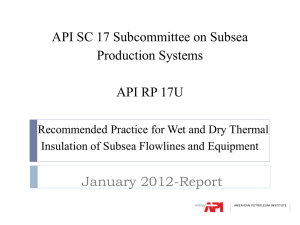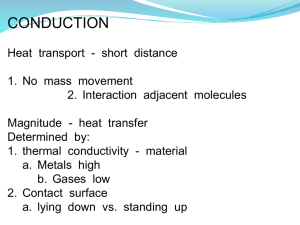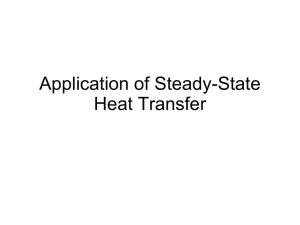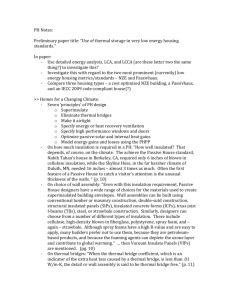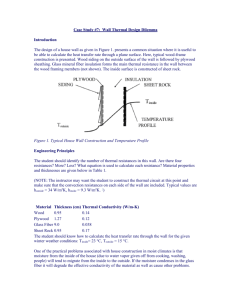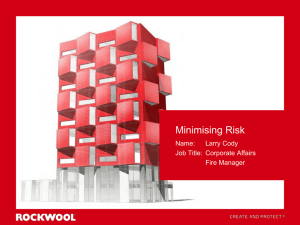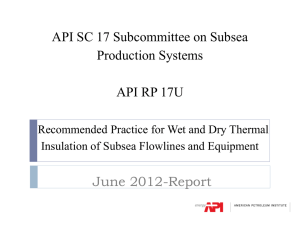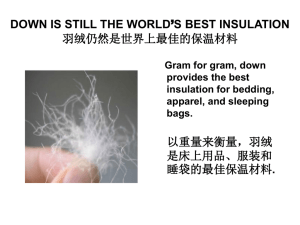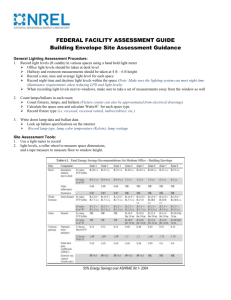Kent Homes Presents 2012 NC Energy Code Amendments as of 3/1
advertisement
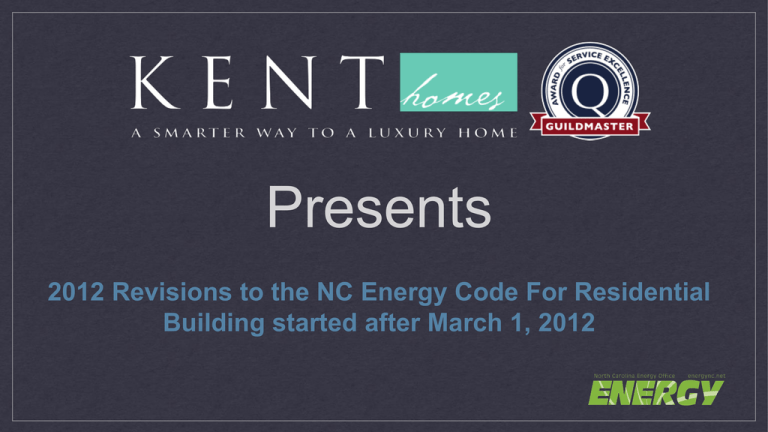
Presents 2012 Revisions to the NC Energy Code For Residential Building started after March 1, 2012 THERMAL ENVELOPE AIR BARRIERS Skylights, Windows and Doors: Must meet the R value requirements set forth in table 1102.1 INSULATION Should be installed in constant contact with the air barrier and should be free of gaps, voids or compression Must be properly installed and incapsulated behind tubs and showers, under stairs, inside fireplace cavities and behind attic walls. THERMAL ENVELOPE INSULATION CONT. For framed walls cavity insulation must be surrounded on all sides with a rigid material or air barrier such as plywood, sheetrock or thermal ply. All walls floors and ceilings must be air sealed. That includes chases and dropped ceilings which must be capped. To separate conditioned space with unconditioned space, blocks must be placed directly under knee walls THERMAL ENVELOPE INSULATION CONT. ACCESS HATCHES & DOORS: All access doors and hatches must be weather stripped and insulated. Vertical access doors on require R-5 insulation. Horizontal access doors require R-10 insulation. One exception is pull down stairs will be insulated to an R-5 value. (Remember that non-rigid insulation is not allowed but attic hatches that enclose the stair system are allowed.) If exposed foam plastic is used on any access make sure it meets the NC provisions for residential code THERMAL ENVELOPE INSULATION CONT. CEILINGS W/OUT ATTIC SPACE ABOVE: Cathedral ceilings, bay windows, and other areas with out sufficient space for insulation may meet the minimum requirement of R-30. The reduction in the requirement is limited to 500 sq. ft. Any area greater than 500 sq. ft. must meet the R value requirement as listed in table 1102.1 for your climate zone. THERMAL ENVELOPE INSULATION CONT. CEILINGS WITH ATTIC SPACE ABOVE: Attics that are fully enclosed require an insulation of R-30. Where space is limited, for example, where the roof, ceilings and wall assemblies adjoin, insulation must on fill the space up to the air baffles. DECORATIVE DOORS & WINDOWS Builder’s are now allowed 15 sq. ft. of non-compliant U- factor and solar heat gain coefficient. THERMAL ENVELOPE HVAC & DUCTS Heating and cooling equipment must be sized in accordance to NC mechanical code. The energy efficiency of these machines must be in NAECA minimum standards. 3 CONSIDERATIONS FOR DUCT INSULATION 1.In conditioned space where heat and AC are always available no insulation is required. 2. In semi-conditioned spaces such as closed crawl spaces and sealed attics, R-4 insulation is required. 3. In unconditioned space, such as vented crawl spaces and unconditioned attics require R-8 insulation. All ducts, air handlers, filter boxes and building cavities used as return ducts must be sealed THERMAL ENVELOPE HVAC & DUCTS DUCT TESTING Duct testing is required. Total duct leakage must be less than or equal to 6 cubic ft per min for every 100 sq. ft. of conditioned floor area when tested at a pressure differential of 25 pascals. Results must be properly noted on the energy efficiency certificate. THERMAL ENVELOPE LIGHTING FIXTURES When recessed lighting fixtures are used in the thermal envelope, they must be sealed with a gasket or caulk between the housing and the ceiling covering. A minimum of 75% of the bulbs installed in permanent light fixtures must be high-efficiency. THERMAL ENVELOPE PERMANENT CERTIFICATE A permanent certificate must be completed by the builder, permit holder, or a registered design professional, then posted in one of the several approved locations in the finished house. 1. On or in the electrical distribution panel as long as it doesn’t block or cover circuit directory labels. 2. A kitchen cabinet. 3. In the attic by the insulation card. 4.Or another location as specified in the code. This concludes our presentation of the 2012 NC Energy Conservation Code Amendments as of March 1, 2012 Thank You from all of us at 1721 Allen’s Lane Suite, 202 Wilmington, NC 28403 (910) 256 5313 www.kenthomes.net
